|
|
|
Sort Order |
|
|
|
Items / Page
|
|
|
|
|
|
|
| Srl | Item |
| 1 |
ID:
134356
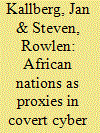

|
|
|
|
|
| Summary/Abstract |
The growth of the African Internet, and services related to the Internet, has been rapid over the last decade. Following this market expansion, a variety of service providers have started to provide access. A fast-growing market puts pressure on the providers to deliver services first and only then seek to secure the networks. Over time, industrialised nations have become more able to detect and trace cyber attacks against their networks. These tracking features are constantly developing and the precision in determining the origin of an attack is increasing. A state-sponsored cyber attacker, such as intelligence agencies and electronic warfare units, will seek to avoid detection, especially when the attacks are politically sensitive intelligence-gathering and intrusion forays into foreign states' networks. One way for the attacker to create a path that links the attacks and the originating country is by actions through a proxy. The less technologically mature developing nations offer an opportunity for cyber aggression due to their lower level of security under the quick expansion of the Internet-based market. Developing countries could be used as proxies, without their knowledge and consent, through the unauthorised usage of these countries' information systems in an attempt to attack a third country by a state-sponsored offensive cyber operation. If the purpose of the cyber attack is to destabilise a targeted society and the attack succeeds, the used proxies are likely to face consequences in their relations with foreign countries, even if the proxy was unaware of the covert activity.
|
|
|
|
|
|
|
|
|
|
|
|
|
|
|
|
| 2 |
ID:
142909
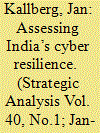

|
|
|
|
|
| Summary/Abstract |
In this commentary, I will use strategic cyberwar theory1 to explain why India has a higher level of cyber resilience than several of its potential adversaries. Even if India has challenges in its government-led cyber defence,2 there are cyber resilience benefits to be drawn from the way Indian society operates, functions and is constitutionally designed and accepted by its constituents, independently of any cyber defence efforts. First, the concept of strategic cyberwar. A strategic cyberwar is a major conflict relying on heavy utilisation of digital means, a form of conflict that we have not yet seen but that is likely to be a potential threat a few decades into the future. Even if technological breakthroughs, adaptations and software development are accelerating at an increasingly high rate, the delay is not a technical issue. Technical evolutions in the software and services sphere are single lines of development. The complexity of cyber war increases with the time factor when cyber conflicts are likely thought at computational speeds. This require an acceptance of cyber as a form of war by itself because it operates in a battle space untangled from other forms of war fighting. Therefore, cyber cannot be seen as only an enabler in traditional defence.
|
|
|
|
|
|
|
|
|
|
|
|
|
|
|
|
| 3 |
ID:
139296
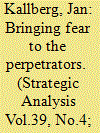

|
|
|
|
|
| Summary/Abstract |
Humanitarian cyber operations would allow democratic states to utilise cyber operations as a humanitarian intervention to capture information and create a foundation for decision making for collective international action supported by humanitarian international law. This follows the legal doctrine of responsibility to protect, which relies first on the nation state itself but when the state fails to protect its citizens, then the international community can act, ignoring the repressive or failed state’s national sovereignty.
|
|
|
|
|
|
|
|
|
|
|
|
|
|
|
|
| 4 |
ID:
128705
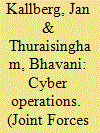

|
|
|
| 5 |
ID:
154778
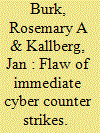

|
|
|
|
|
| Summary/Abstract |
A dominant paradigm for militarised cyber operations, owing to a growing interest in such actions, is seeking an ability to strike back and launch cyber counter attacks immediately after being attacked. This commentary challenges view based on the argument that it leads to a contra-productive tit-for-tat game with no decisive or deterrent outcome. It argues that cyber attacks are information, which an initially passive targeted society can gather to refine and consolidate its cybersecurity and over time receive an advantage over the initial attacker. Therefore, a restrained posture would be beneficial if utilised for refinement, information-gathering, development and preparing for enhanced abilities to cyber counter strike once an advantage is reached.
|
|
|
|
|
|
|
|
|
|
|
|
|
|
|
|
|
|
|
|
|